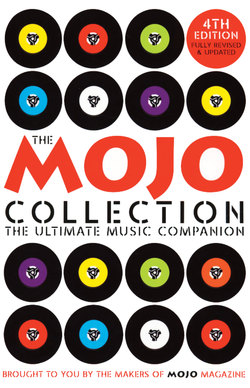Читать книгу The Mojo Collection - Various Mojo Magazine - Страница 154
На сайте Литреса книга снята с продажи.
The MC5 Kick Out The Jams Bucking tradition, these Motor City rock revolutionaries released a live album as their debut.
ОглавлениеRecord label: Elektra
Produced: Jac Holzman and Bruce Botnick
Recorded: Grande Ballroom, Detroit, Michigan; October 30 and 31, 1968
Released: February 1969
Chart peaks: None (UK) 30 (US)
Personnel: Rob Tyner (v); Fred ‘Sonic’ Smith (g, v); Wayne Kramer (g, v); Dennis Thompson (d, v); Michael Davis (b); Bruce Botnick (e)
Track listing: Ramblin’ Rose; Kick Out The Jams; Come Together; Rocket Reducer No. 62 (Rama Lama Fa); Borderline; Motor City Is Burning; I Want You Right Now; Starship
Running time: 36.17
Current CD: Elektra 7559740422
Further listening: High Time (1971) – the band’s final studio album was a return to their rough and tumble roots, after the more sanitised ‘commercial’ sounds of 1970’s Back In The USA; Babes In Arms (1973), rarities and never released tracks; The Big Bang Beat: The Best Of The MC5 (2000), a well-chosen collection of the 5’s grittiest tracks and free jazz masterworks
Further reading: MC5: Kick Out The Jams 33 1/3 (Don McLeese, 2005); MC5: The Future Is Now! (Michael Simmons, 2004); www.mc5.org
Download: HMV Digital; iTunes
Detroit’s MC5 fuelled their vision of revolution by grafting it onto high-octane garage rock, using their guitars as assault weapons against a lethargic status quo. Under the guiding hand of poet and activist John Sinclair, The MC5 created the soundtrack for the nascent White Panther Party, promulgating the incendiary ethos of ‘Rock’n’roll, dope and fucking in the streets’.
Over the years, the leftist politics may have become quaint, but Kick Out The Jams remains a fine blast of serrated rock rage. In addition to polemics, the ‘5’ established their own religion, Zenta, and it was on the Zenta New Year in 1968 – Halloween weekend – that the band planned to record their debut record at Detroit’s Grande Ballroom, where they’d been gigging weekly for two years, opening up for better known bands. In fact, the band dubbed their album after a phrase they used to heckle the star attractions.
‘More often than not, the bands were really tired,’ explains guitarist Wayne Kramer. ‘They’d come from San Francisco and play all this kind of electric folk music. I mean they were wimpy, they had no passion, they were posers, slackers, and we were young and aggressive fellows and so we used to harass them. We’d scream at them from the wings, “Kick out the jams or get off the stage.” Or, “Get down, brother or get the fuck out!”’
MC5 were offering up a gritty, cacophonous rock show, complete with atonal industrial din of the Detroit factories and unapologetic distortion that was best experienced live, so it was not a surprise that they chose to debut with a live album.
‘We really worked hard at perfecting a performance that on a bad night would be great and on a good night would be unbelievable,’ remembers Kramer. ‘The MC5 were a mercurial band. All of a sudden this was “the” night, we were making “the” record, the posters were up, the fans were there and the recording truck was in from California, and the record company was there, and it was a lot of pressure for us to be under. In fact it rattled us. I hear it every time I listen to the record.’ Though he admits it’s not the band’s best work, Kramer acknowledges, ‘Our power is concentrated in that record in a way that you can’t deny. Kick Out The Jams is a powerful statement of a time.’
